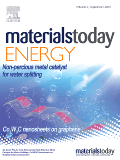
Materials Today Energy
Scope & Guideline
Advancing Sustainable Solutions for Tomorrow's Energy Needs
Introduction
Aims and Scopes
- Energy Storage Materials:
Research on materials used for energy storage systems, including batteries (Li-ion, Na-ion, Zn-ion), supercapacitors, and solid-state batteries, focusing on enhancing performance, stability, and safety. - Photovoltaic Technologies:
Innovations in solar energy conversion, including the development of new materials for solar cells (organic, perovskite, and thin-film technologies) aimed at improving efficiency and stability. - Electrocatalysis and Fuel Cells:
Studies on catalysts for energy conversion processes, particularly in water splitting, CO2 reduction, and fuel cells, focusing on enhancing catalytic performance and reaction mechanisms. - Thermoelectric Materials:
Development of materials that can convert temperature differences into electrical energy, with a focus on improving thermoelectric efficiency and performance in various applications. - Sustainable and Green Technologies:
Research promoting the use of renewable resources and environmentally friendly materials, including waste-derived materials and biomimetic approaches for energy applications. - Nanostructured Materials:
Exploration of nanoscale materials and their unique properties to enhance performance in energy-related applications, including their synthesis, characterization, and integration into devices.
Trending and Emerging
- Advanced Solid-State Batteries:
There is an increasing emphasis on solid-state battery technologies, which promise higher energy densities and improved safety compared to traditional liquid electrolyte batteries. - Hybrid Energy Systems:
Research is trending towards hybrid systems that combine multiple energy storage technologies, such as integrating supercapacitors with batteries to enhance performance and efficiency. - Nanomaterials and 2D Materials:
Emerging interest in nanostructured materials, particularly two-dimensional materials like MXenes and graphene, for their unique properties and potential applications in energy storage and conversion. - Artificial Intelligence in Materials Research:
The application of AI and machine learning for materials discovery and optimization is gaining traction, enhancing the efficiency of research and development in energy materials. - Environmental Remediation Technologies:
Increased focus on materials and technologies aimed at environmental remediation, including CO2 capture and conversion, highlights the intersection of energy and environmental sustainability. - Bio-inspired Materials and Processes:
There is a growing trend towards the development of bio-inspired materials and processes, reflecting a shift towards sustainable and efficient energy solutions.
Declining or Waning
- Conventional Battery Technologies:
Research on traditional lithium-ion batteries is becoming less prominent as new materials and technologies for energy storage gain attention, such as sodium-ion and zinc-ion batteries. - Single-Use Materials:
The focus on single-use or non-recyclable materials is declining in favor of sustainable and recyclable materials, reflecting a broader trend towards environmental responsibility. - Basic Theoretical Studies:
There is a noticeable shift away from purely theoretical studies without immediate practical application, towards research that combines theoretical insights with experimental validation and real-world applications. - Rigid Solar Cell Designs:
Research on rigid and less flexible solar cell designs is waning, as there is a growing demand for flexible, lightweight, and portable solar energy solutions. - Electrolytes for Conventional Batteries:
The exploration of traditional liquid electrolytes is declining as more attention shifts towards solid-state and gel electrolytes that offer improved safety and performance.
Similar Journals
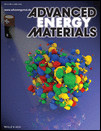
Advanced Energy Materials
Leading the Charge in Renewable Energy TechnologiesAdvanced Energy Materials is a leading academic journal published by WILEY-V C H VERLAG GMBH, focusing on the rapidly evolving fields of materials science and renewable energy technologies. With an impressive impact factor and recognition as a top-tier journal, it ranks within the Q1 category in both Materials Science (miscellaneous) and Renewable Energy, Sustainability and the Environment as of 2023. Spanning from 2011 to 2024, the journal serves as an essential platform for researchers, professionals, and students eager to explore groundbreaking advancements in energy materials, fostering innovative solutions to global sustainability challenges. The journal's authoritative content is supported by rigorous peer review, ensuring high-quality research contributes to the academic community and beyond. Located in Weinheim, Germany, Advanced Energy Materials stands at the forefront of scientific inquiry, making it an invaluable resource for those invested in the future of energy and materials science.
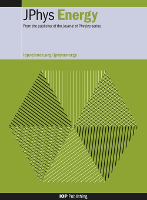
Journal of Physics-Energy
Catalyzing Breakthroughs in Interdisciplinary Energy ResearchJournal of Physics-Energy, published by IOP Publishing Ltd, is a leading Open Access journal that serves as a dynamic platform for the dissemination of high-quality research within the interdisciplinary realms of energy, materials science, and materials chemistry. Since its inception in 2019, the journal has gained remarkable recognition, achieving a prestigious Q1 ranking in multiple categories in 2023, highlighting its impact within these rapidly evolving fields. With its Scopus Ranks, placing it in the top 10% of journals for General Energy and within the top 20% for Materials Science disciplines, it reflects the commitment to excellence in research and innovation. Conveniently based in the United Kingdom, the journal is designed to facilitate collaboration and knowledge exchange among researchers, professionals, and students dedicated to advancing the understanding of energy technologies and materials science. The open access model ensures that cutting-edge research is freely available, promoting global accessibility and engagement with the latest scientific advancements.

Advances in Energy Research
Pioneering Innovations in Energy Efficiency and Technology.Advances in Energy Research is a prominent journal dedicated to the exploration and advancement of energy technologies and sustainable practices. Published by TECHNO-PRESS, this journal serves as a vital platform for researchers, professionals, and students in the energy field, featuring innovative studies and reviews that contribute to the body of knowledge surrounding energy efficiency, renewable resources, and the integration of new technologies. The journal holds a significant position in energy research and aims to facilitate the dissemination of groundbreaking findings and ideas that are pivotal for the transition toward a more sustainable energy future. Located in South Korea, with an ISSN of 2287-6316, it embraces an open access philosophy that ensures widespread availability of its content, further enhancing its impact in the academic community.

Advanced Energy and Sustainability Research
Exploring Innovations in Energy and Environmental ScienceAdvanced Energy and Sustainability Research is a leading open-access journal published by WILEY since 2020, dedicated to advancing knowledge and understanding in the realms of energy and sustainability. With an impressive impact factor and a commitment to high-quality, peer-reviewed research, this journal serves an international audience of researchers, professionals, and students passionate about addressing critical environmental challenges. The journal encompasses a wide array of topics within environmental science and energy fields, securing notable rankings in Scopus with top percentiles across several categories, including Ecology, Energy Engineering and Power Technology, and Waste Management. Given its open-access model, Advanced Energy and Sustainability Research facilitates the dissemination of cutting-edge research, enhancing accessibility and fostering collaboration within the scientific community. This journal not only plays a pivotal role in shaping public policy and industry practices but also aims to inspire innovative solutions for sustainable development in an increasingly complex world.
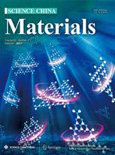
Science China-Materials
Leading the Charge in Materials Research Excellence.Science China-Materials is an esteemed peer-reviewed journal dedicated to advancing the field of materials science, published by SCIENCE PRESS. With a strong focus on innovative research and applications, this journal provides an essential platform for disseminating groundbreaking findings in materials development, characterization, and engineering. Since its inception, Science China-Materials has achieved an impressive Q1 ranking in the Materials Science (miscellaneous) category, reflecting its commitment to quality and the impact of its publications, as indicated by its 86th percentile ranking in Scopus. The journal is set to converge its contributions from 2016 to 2024, making it a vital resource for researchers and professionals interested in the latest advancements and trends in materials science. As an open access publication, it ensures that knowledge is freely available to a global audience, promoting collaboration and innovation across disciplines. The journal is headquartered in Beijing, China, and continues to attract high-quality submissions from leading experts in the field.

Energy Materials
Empowering Energy Technologies Through Cutting-Edge Research.Energy Materials is a pioneering journal published by OAE PUBLISHING INC, dedicated to the dynamic field of energy materials science and engineering. With a focus on advancing knowledge related to materials used in various energy applications such as batteries, fuel cells, and solar cells, this open-access journal aims to disseminate cutting-edge research and innovative methodologies to a global audience. By offering a platform for original research, reviews, and case studies, Energy Materials plays a crucial role in bridging the gap between materials science and energy technology, facilitating the development of sustainable energy solutions. Researchers, professionals, and students alike will find invaluable insights in its pages, fostering advancements in this essential sector. To explore the latest developments in energy materials, visit Energy Materials at OAE PUBLISHING INC.

EnergyChem
Advancing Sustainable Solutions in Energy Chemistry.EnergyChem is a premier academic journal published by ELSEVIER, dedicated to advancing the field of energy chemistry and its applications in sustainable technologies. With a strong focus on biomaterials and innovative chemistry solutions, the journal has established itself as a leading platform within the research community, boasting remarkable rankings such as Q1 in Biomaterials, Chemistry (miscellaneous), and Energy (miscellaneous) for 2023. Notably, it ranks 2nd in both Materials Science and Energy categories, reflecting the high caliber of research it publishes, which is crucial for tackling pressing global energy challenges. Since its inception in 2019, EnergyChem has been committed to open and accessible research, making it an invaluable resource for researchers, professionals, and students striving for cutting-edge insights in energy conversion and storage. With its target audience in mind, the journal encourages submissions that explore innovative materials, processes, and applications that will contribute to a sustainable energy future.

Energy Material Advances
Driving Progress in Fuel Technology and SustainabilityEnergy Material Advances, published by the American Association for the Advancement of Science, stands at the forefront of energy research, showcasing groundbreaking studies in the realm of renewable energy, fuel technology, and materials science. With the journal's commitment to open access since 2020, it aims to democratize knowledge and foster innovation across a global community of researchers, professionals, and students. The journal boasts an impressive impact factor, placing it firmly within the Q1 category across multiple disciplines including Energy (miscellaneous), Fuel Technology, and Renewable Energy, Sustainability and the Environment, highlighting its significance in advancing scholarly discussions. In the latest Scopus rankings, Energy Material Advances ranks among the top 10% of journals in its field, affirming its role as a pivotal resource for current and emerging trends in energy materials. The journal is dedicated to facilitating collaborative efforts and inspiring novel approaches to the challenges posed by energy sustainability and technological advancement.

SusMat
Empowering Change through Sustainable Material ScienceSusMat is a pioneering open access journal published by WILEY, with an ISSN of 2766-8479 and E-ISSN of 2692-4552, dedicated to advancing knowledge in the field of sustainable materials and technologies. Launched in 2021, SusMat aims to provide a vibrant platform for researchers, professionals, and students from interdisciplinary backgrounds to explore and disseminate innovative materials and strategies that promote sustainability. With an emphasis on high-quality, peer-reviewed research, this journal contributes to the growing body of literature essential for addressing contemporary environmental challenges. Furthermore, the open access format enhances accessibility and dissemination of knowledge, encouraging broader engagement and collaboration within the scientific community. Discover the future of sustainable materials at SusMat, where impactful research meets global sustainability goals.
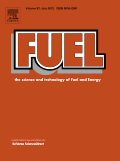
Fuel
Driving Research for a Sustainable TomorrowFuel is a premier international journal published by Elsevier Science Ltd, showcasing critical advancements and insights in the fields of chemical engineering, energy engineering, power technology, and organic chemistry. With a significant history dating back to 1922 and continuous publication from 1970 to 2025, Fuel holds an impressive position in the academic community, reflected in its top-tier rankings—Q1 in multiple categories including Fuel Technology and Chemical Engineering for the year 2023. This journal is dedicated to exploring innovative research and application of fuel technologies, driving forward the dialogue on sustainable energy solutions. Researchers and professionals alike will find Fuel to be an essential resource, providing access to high-impact articles that contribute to advancements in methodologies and applications, while navigating the complexities of global energy challenges.